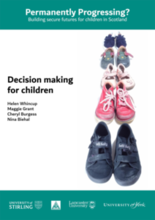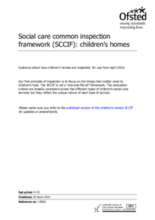Displaying 61 - 70 of 281
The aim of this article is to offer a working blue print to guide the adaptation of quality initiatives aimed at transforming residential care in other child welfare organizations or jurisdictions while taking into consideration the fit of such initiatives within the service environment and the complexities of system-wide change.
The Decision making for children report is one strand of the Permanently Progressing? study. In this strand, during 2015-17, 160 decision makers were interviewed across Scotland mainly in groups, but some individually.
As part of a 3‐year US federal project of family group conferences (FGCs) in one jurisdiction, this study collected fidelity data from professional and family member participants of FGCs, including children and young people. Descriptive data from a small sample of child and young people participating in FGC suggest differences in their perspectives regarding family empowerment, transparency, and inclusion in decision making, when compared with the perspectives of other family members and professionals for whom data are available.
Given the impact that institutional care has been found to have on psychological and cognitive outcomes, the authors make the case for the adaptation of Early Childhood Child Care HOME (EC-CC-HOME), a world-renowned instrument that assesses children’s child-care environment, to the Greek context.
The Care Pathways and Outcomes Study is a longitudinal study following 374 children who were in care and under five years old on 31/3/2000 in Northern Ireland. The study followed where the young people ended up living, whether they returned to their birth parents, went into kinship or non-relative foster care, or were adopted.
This open access research paper examines the influence of children, birth parents and foster carers on the matching decision from a practitioner's perspective.
The Community Placement and Case Management (CPCM) Programme aims to provide a holistic case management system that specifically looks into the protection concerns of migrant, undocumented, stateless, refugee, and asylum seeking Unaccompanied and Separated Children (UASC) at risk of arrest and detention and those directly affected by immigration detention in Malaysia.
As technology enhancements effectively augment family-based interventions, the purpose of this study was to pilot a smartphone application (app) in the context of a trauma and behavior management-informed training for foster and kinship caregivers.
This inspection framework, developed by the UK's Office for Standards in Education, Children's Services and Skills (Ofsted), provides guidance about how children’s homes are inspected, for use from April 2019.
This study aims to analyze the comparative effectiveness of Youth Self-Report (YSR) and the Strengths and Difficulties Questionnaire (SDQ) as screening tools of psychological (mal)adjustment, looking for differences in the way psychological problems and difficulties are identified by these two measures in adolescents in residential care (RC).



